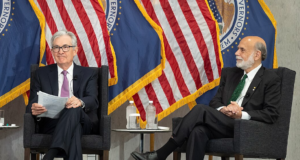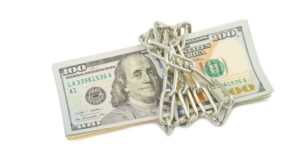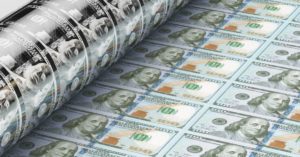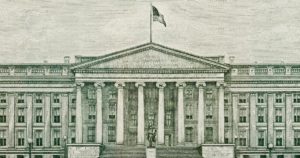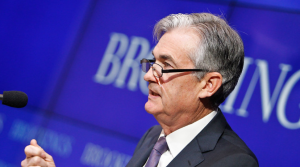It is hard to exaggerate the importance of China in the future of gold even if the relationship falls short of monocausal. Beijing’s actual course both in economic policy and geopolitics since its giant bubble economy turned to bust — starting circa 2020 — has had a huge bearing on gold’s super-strong performance. By contrast if the bust were to spark somehow a triumph of economic and political freedom in China, a continuing stellar rise for gold would depend, most likely, on a further collapse of general confidence in fiat money led by the dollar hegemon.The roots of gold’s dependence on China do not figure at all in the conventional IMF/Keynesian analysis of the present “malinvestment problem” in that country. According to this analysis the huge loss of private
Read More »Articles by Brendan Brown
Is High Inflation Followed by Demands for Sound Money? Usually Not.
July 10, 2024The severe losses for the center-right parties in the mid-summer French and British general elections, (i.e., Macron’s center-right coalition partners and Britain’s Tories) together with a shift in the US toward MAGA within the Republican Party, pose a severe and possibly existential challenge to the ideal of sound money. This is despite surveys revealing strong and broad popular anger about the cumulative loss of purchasing power of their money during the pandemic and its aftermath. Moreover, the hypothesis that the ideal of sound money gets a political fillip during and following a serious episode of inflation, is mythological rather than based on research from the laboratory of monetary history. The expectation that there will be responsive changes in monetary
Read More »The Myth of the Equilibrium Interest Rate
April 13, 2024“Fast thinking” is a corrupting short-cut in mental processes which the late Daniel Kahneman identified by experiments in financial decision-making. Fast thinking plagues the market-place as it responds to the new threat of responses to Fed-led inflation. That threat had emerged even before the post-pandemic inflation starting in late 2022 cooled from its peak levels. The most recent surge in prices had materialized even though its symptoms in goods markets were tamed by reversal of earlier supply side dislocations.An often-reported theme illustrating the current inflation angst suggests the Powell Fed will start to cut its policy rate by Summer 2024 out of misplaced complacency or due to political calculation. According to some of the inflation worriers, that
Read More »The Death of Easy Money Has Been Greatly Exaggerated
March 8, 2024Tu ne cede malis, sed contra audentior ito
Website powered by Mises Institute donors
Mises Institute is a tax-exempt 501(c)(3) nonprofit organization. Contributions are tax-deductible to the full extent the law allows. Tax ID# 52-1263436
[embedded content]
Tags: Featured,newsletter
Read More »The Death of Easy Money Has Been Greatly Exaggerated
February 21, 2024Reports on the death of the present cycle of politically motivated monetary easing, in the words of Mark Twain, grossly exaggerated. Contemporary market analyses are full of how the Fed and ECB are dialing back on previous hints of Spring 2024 rate cuts. In tune with this, commentators are lauding the central banks, especially the Fed, for a show of political independence as elections approach.
The bigger picture though suggests otherwise. In the economic aftermath of the pandemic, monetary policy has again been blatantly political.
Yes, in both the US and Europe, central banks have had the chutzpah to claim credit for slowing down the rise of consumer prices. The truth is they have taken advantage of the supply boost from fading pandemic dislocations to pursue
The Dollar See-Saws between Two Views on Fiscal Explosion
November 10, 2023As the Biden administration ramps up new government spending—and budget deficits—to unheard-of peacetime levels, reality sets in. No economy and no currency can withstand this explosive assault for very long.
Original Article: The Dollar See-Saws between Two Views on Fiscal Explosion
[embedded content]
Tags: Featured,newsletter
Read More »Default by Inflation Is the Real Drama in the Global Debt Market
June 12, 2023The real drama of default in global markets has not been the federal debt ceiling negotiations in Washington but the write-off by inflation. The issue of whether it turns out that the US Treasury for a few weeks has been slow in servicing its debts—with all delays subsequently rectified—is a sideshow. We could regard this as camouflage for the ongoing real write-off operation. In this, countries led by the US, where a great inflation emerged during the pandemic and Ukraine war, have achieved big reductions in the real value of their debts.
The governments have also gained from a reduction in the total nominal market value of their fixed-rate debts due to the rise in interest rates. Those gains do not show up directly in national accounts. Rather, they are
A Pyrrhic End to 130 Years of Vicious Bad Money and Banking Crises
May 6, 2023The current banking crises have deep roots in US financial history. Monetary authorities have engaged in inflationary behavior for more than a hundred years.
Original Article: "A Pyrrhic End to 130 Years of Vicious Bad Money and Banking Crises"
[embedded content]
Tags: Featured,newsletter
Read More »A Pyrrhic End to 130 Years of Vicious Bad Money and Banking Crises
April 20, 2023The original vicious circle starts with inflationary interventions in an up-to-then well-anchored monetary regime. Consequent asset inflation spawns a banking crisis. That leads to the installation of anticrisis safety structures (one illustration is a novel or enhanced lender of last resort). Alongside a possible monetary regime shift, these damage the money’s anchoring system. A great asset inflation emerges and leads on to an eruption of another banking crisis, devastating in comparison with the first.
An array of additional safety structures is put in place which makes the now-bad money worse than before. After a long and variable lag, a long and violent monetary storm means the safety structures fail, a banking crisis again erupts but this time milder than
The Chimera of a Postpandemic Postwar Return to Monetary Normal
January 13, 2023The monetary regime in power now—the so-called 2 percent inflation standard—is promising us a “return to normal” after the great pandemic and war inflation of 2021–22. At this time of powerful propaganda—the dismal accompaniment of natural disaster and war—we should be on our guard against such messaging. Even more so when we consider the success of this regime in repudiating blame for the great asset inflation culminating in the global financial crisis of 2008, going on to win widespread applause for the low consumer price inflation and ultimately low unemployment in the subsequent decade.
Readers of Mises Wire doubtless count among their New Year resolutions a determination to resist propaganda, and in the monetary sphere this means a readiness to assess in
The Fraudulent Social Contract of Bad Money Regimes
October 9, 2022Sorry, I’ve looked everywhere but I can’t find the page you’re looking for.
If you follow the link from another website, I may have removed or renamed the page some time ago. You may want to try searching for the page:
Search
Searching for the terms %3Futm+source%3Drss%26utm+medium%3Drss%26utm+campaign%3Dbrown+fraudulent+social+contract+money+regimes …
Read More »The Story of War and Peace in the Currency Markets
August 29, 2022There is a story of war and peace in the contemporary currency markets. It has a main plot and many subplots. As yet, the story is without end. That may come sooner than many now expect.
The narrator today has a more challenging job than the teller of the story about neutral, Entente, and Central Power currencies during World War I. (See Brown, Brendan “Monetary Chaos in Europe” chapter 2 [Routledge, 2011].)
Today’s Russia war (whether the military conflict in Ukraine or the EU/US-Russia economic war) is not so all-pervasive in global economic and monetary affairs, though it is doubtless prominent. The monetary setting of the story today is much more nuanced than in World War I when the prevailing expectation was that peace would mark the start of a journey where
Even When There Is Inflation, the Fed STILL Fights Falling Prices
June 16, 2022Under any remotely sound money regime the aftermath of war and/or pandemic is highly likely to feature a sharp decline in the prices of goods and services on average. Even under unsound money regimes there are powerful forces operating towards lower prices once the war/pandemic recedes. Strong injections of monetary inflation, however, can overpower them.
The Fed and all the foreign central banks which follow its lead and/or doctrines are apparently of the intention that this time the decline in prices will not take place. Instead, they state the aim of their monetary policies, to be achieved within two years, as a decline of the inflation rate from present near-term highs to 2 percent.
In combatting the powerful “natural rhythm” of prices downwards in the
We Still Haven’t Reached the Inflation Finale
April 13, 2022Inflations have an inbuilt mechanism which works to burn them out.
Government (including the central bank) can thwart the mechanism if they resort to further monetary injections of sufficient power.
Hence inflations can run for a long time and in virulent form. This occurs where the money issuers see net benefit from making new monetary injections even though likely to be less than for the initial one which took so many people by surprise.
Ultimately at some point the cost-benefit calculus shifts in favor of government not blocking the operation of the burn-out mechanism.
Let’s try to work out which model of burnout the Great Pandemic inflation in the US will follow.
Our process of discovery starts with Milton Friedman’s observation about the nature of the
The West’s Russia Sanctions Could Lead to Many Unpredictable and Unpleasant Outcomes
March 20, 2022Global supply shocks are historically rare events. All the more extraordinary to have two such shocks in quick succession—the second arriving even before the first has entirely faded away. That is what the world now experiences in the form of the Great Pandemic followed by the Great West-Russia economic war. The most visible symptom of the supply disruption is the sky-high price of energy and a range of other commodities.
What Is the Effect of Sanctions?
The waging of a long and all-out military war usually, if not always, exerts a toll in terms of surging prices. But what about economic war waged through Western sanctions by states not simultaneously engaged in direct military conflict? The laboratory of history for such warfare is small. Indeed, there is no
How Easy Money Inflated Corporate Profits
January 13, 2022In the incessant media discussion about whether inflation is transitory there is a big elephant in the room about which all are silent. Perhaps strangely some do not see it. Others for whatever reason pretend it is not there. The elephant is the fantastic surge in US corporate profits that monetary inflation has fueled during the second year of the pandemic. This elephant’s unremarked appearance is likely transitory, unlike the simultaneous jump in US consumer prices.
Transitoriness is the essential theme of the contemporary Fed show—a point it has in common with Arthur Miller’s Death of a Salesman. There antihero Willy Lowman laments that in the twilight of his working life he still feels “temporary.” The Fed show, though, fits best into the theater of the
How Asset Price Inflation Is Different from Goods Price Inflation
November 14, 2021There has been no constant concept of asset price inflation through the modern age of fiat money even amongst those who recognize the condition. The term has become most popular in the present period of inflation targeting coupled with the use of radical monetary tools. The historian of economic thought could doubtless find some common threads through the evolving concept going back into the nineteenth century or earlier (indeed the first big example is the Dutch monetary inflation of the 1630s featuring tulip mania, the bubble in stock of the Dutch East India Company and Amsterdam real estate). Even so he or she would have to confront much perplexity.
How could Milton Friedman and Anna Schwartz have described the years 1922–28 as the heyday of the Federal
Gold Could Offer A Way Out Of Switzerland’s Failing Inflationist Experiment
February 8, 2021Never mind that the US Treasury’s indictment late last year of Switzerland as a currency manipulator rested on some flawed evidence and does not identify the crime. The clash between Washington and Berne marks another episode in this alpine nation’s dark history of trucking with foreign repression rather than developing its potential as a global haven and beacon of freedom. Occasionally there have been bright interludes but none so far with respect to the last quarter century of growing monetary repression as led by the US and now prevalent throughout the world.
The Trump administration’s Treasury based its indictment of Switzerland on crossing the three boxes on the ridiculous checklist for manipulation inherited from the Obama Treasury—current account surplus,
Why the 2020s Won’t Be like the Roaring 20s
January 9, 2021The 1920s featured political détente, debt liquidations by prior consumer price inflation, an introductory stalling of monetary inflation, a German economic miracle, and a broad-based technological revolution. The 2020s have none of these.
This Audio Mises Wire is generously sponsored by Christopher Condon. Narrated by Michael Stack.
Reincarnation of the Roaring Twenties—one century on from the 1920s—is the lead speculative narrative this new year on Wall Street, it seems.
The storytellers, well aware of how interest income–famine investors seek “justification” to load up on ever-higher-priced equities and risky credit paper, turn to the history lab with its notoriously small sample sizes. They have spotted that 2021 marks the hundredth birthday of a postwar
The Fed’s Latest Lie: It Can Make Everything Go Back to Normal
September 5, 2020The Fed Emperor’s New Clothes Show is a continuous comedy without laughter. The latest act, the virtual Jackson Hole conference (August 27), was dreadful.
The show’s audiences are accustomed to the Fed chair and his board delivering solemn pronouncements about their aims—low inflation, high employment, and financial stability. These officials play their parts according to script. They never explain how they will fulfill their promise—it is all boast and no substance. The assembled courtiers, including the financial media representatives who form part of the Fed’s propaganda machine, never ask difficult questions. Those inclined toward skepticism fear exposing their own lack of knowledge or losing their jobs.
In the just finished Jackson Hole episode, Chief Powell
Narrative Economics: How Stories Go Viral and Drive Major Economic Events
May 24, 2020Narrative Economics: How Stories Go Viral and Drive Major Economic EventsRobert J. Shiller
Princeton: Princeton University Press, 2019xxi + 377 pp.
Abstract: Much of Shiller’s new book is about how economic narratives form, spread, and fade. Drawing on medical evidence about the spread of infectious disease, Shiller argues that “economic fluctuations are substantially driven by contagion of oversimplified and easily transmitted variants of economic narratives.” But Shiller ignores the powerful role of monetary disorder, whether in forming the narrative or determining the contagion rate, or as a competitor to the narrative. Ignoring or downplaying money’s role leaves Narrative Economics a disappointment.
recession — housing bubble —monetary policy — narrative
The Prospects for a Sound-Money Revolt against the Dollar and Euro
January 19, 2020In the last decade, the combination of virulent asset price inflation and low reported consumer price inflation crippled sound money as a political force in the US and globally. In the new decade, a different balance between monetary inflation’s “terrible twins” — asset inflation and goods inflation — will create an opportunity for that force to regain strength. Crucial, however, will be how sound money advocacy evolves in the world of ideas and its success in forming an alliance with other causes that could win elections.
It is very likely that the deflationary nonmonetary influences of globalization and digitalization, which camouflaged the activity of the goods-inflation twin during the past decade, are already dissipating.
The pace of globalization may have


